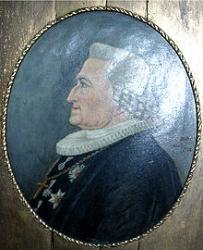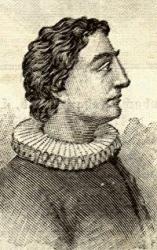1525 - 1587 Person Name: J. Magdeburg Topics: The Church Year Third Sunday in Lent; The Church Year Third Sunday in Lent Author of "Who trusts in God, a strong abode" in The Lutheran Hymnary Magdeburg, Joachim , was born circa 1525 at Gardelegen in the Altmark. He matriculated at the University of Wittenberg, April, 1544, and in 1546 was appointed rector of the school at Schöningen, near Helmstädt, Brunswick. He became pastor of Dannenberg in Lüneburg in 1547, but being unable to exist on his slender income resigned in 1549, and in the same year became pastor of Salzwedel in the Altmark. But refusing to adopt the Roman ceremonies prescribed by the Act of Interim he was, in 1552 (Easter Sunday, April 17) banished from the Electorate of Brandenburg. About May, 1552, by the influence of Johann Aepinus, Superintendent of Hamburg, he was appointed diaconus of St. Peter's Church in Hamburg, and there became acquainted with Flacius Illyricus [Matthias Flach, Extreme Lutheran, church historian, &c, died at Frankfurt-am-Main, March 11, 1575]. After the death of Aepinus, May 13, 1553, Paulus von Eitzen, his successor, was not so friendly, and when, during the controversy in 1558 regarding Holy Communion, Magdeburg published a tractate without submitting it to the revision of Eitzen, the latter obtained the removal of Magdeburg from his post, May 25, 1558. He then went to Magdeburg to help his friend Flacius as one of the compilers of the Church history known as the Magdeburg Centuries. Shortly thereafter he was appointed pastor of Ossmanstedt in Thuringia; but, as a follower of Flacius, was dispossessed in 1562. He then stayed for longer or shorter periods with Count von Mansfeld, Baron von Schönburg and others, until, after the Emperor Maximilian II. had once more permitted Protestant preachers in Austria, he was, at Count von Mansfeld's recommendation, appointed by the commandant of Raab in Hungary as regimental chaplain at Raab in 1564, and, after his house there was burnt, at the castle of Gräfenworth (east of Krems), to the German-speaking Austrian troops. There he had to contend with the machinations of the Roman clergy, and after joining with nineteen others of the Evangelical clergy in Austria in presenting a Confession of Faith to an Austrian Diet (Landtag), was compelled to leave; and in 1571 we find him living at Erfurt. In 1581 he was preacher at Efferding in Austria; but in 1583 was expelled as an adherent of Flacius. His later history is unknown (Koch, i. 446; Allgemeine Deutsche Biographie, xx., 53, &c). Wachernagel, iii. pp. 1035-1042, gives five pieces under his name. The only one translation into English is:—
Wer Gott vertraut, hat wohl gebaut. Trust in God. Founded on Ps. lxxiii. 25, 26. Wachernagel, iii. p. 1042, prints st. i. from Magdeburg's Christliche und tröstliche Tischgesenge, mit vier Stimmen, Erfurt, 1572 (where it is the hymn for Saturday evening); and thinks it probable, though not certain, that it is an original by Magdeburg. In S. Calvisius's Harmonia cantionum ecclesiasticarum, Leipzig, 1597, st. ii. and iii., are first found. Lauxmann in Koch, viii., 373, thus sums up the evidence:—
”From these circumstances it seems evident that the hymn originally consisted only of the first stanza, but that Magdeburg's authorship, in opposition to other claims [it has been ascribed to J. Kolross and to J. Mühlmann] is beyond doubt."
The text of 1597 is repeated in Wachernagel, iii. p. 1043, and the Unverfälschter Liedersegen, 1851, No. 642, in 3 st. of 8 (or 12) lines. Translated as:—
1. Who trusts in God, his work abides. By A. T. Russell, of st. i., ii., as No. 230, in his Psalms & Hymns, 1851.
2. Who puts his trust in God most just. A good and full translation by Miss Winkworth, in her Lyra Germanica, 2nd Service, 1858, p. 192, and her Chorale Book for England, 1863, No. 145. Repeated, slightly altered, in the Pennsylvania Lutheran Church Book, 1568.
3. Who trusts in God a strong abode. A good but free translated by Dr. B. H. Kennedy, as No. 486, in his Hymnologia Christiana, 1863, repeated in J. L. Porter's Collection 1876, and others. In Morrell and How's Psalms & Hymns, 1864, No 208, it was considerably altered by Bishop How, and this form is repeated in the Society for Promoting Knowledge’s Church Hymns, 1871; Thring's Collection, 1882, and others; the Baptist Hymnal, 1879, omitting the last four lines, and ascribing it, in error, to M. Luther.
Another translation is: "Who lives in God has safe abode." By Dr. H. Mills, 1856, p. 244. [Rev. James Mearns, M.A.]
-- John Julian, Dictionary of Hymnology (1907)
Joachim Magdeburg


